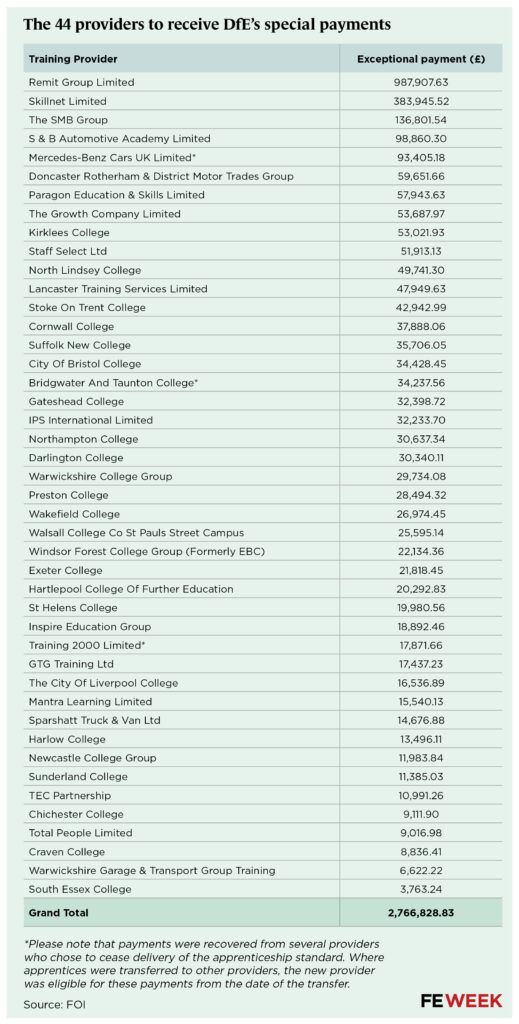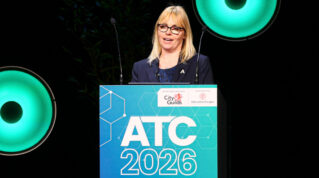The Department for Education quietly spent almost £3 million on first-of-their-kind compensation payments to dozens of training providers after a botched apprenticeship funding band decision.
Forty-four providers of the heavy vehicle technician apprenticeship received one-off payments totaling £2.76 million. Officials issued “exceptional retrospective payments” after the department admitted it had underfunded the programme for years.
Documents released to FE Week under freedom of information laws reveal that Remit Training received the lion’s share, nearly £1 million, followed by Skillnet, which was awarded £383,000. The SMB Group received £136,000.
The 41 other providers each received between £3,000 and £99,000.
Experts believe the DfE has set a precedent for more campaigns from providers in other sectors to receive similar special payments where they can prove funding band decisions were flawed and have not covered delivery costs.
Who was at fault?
The HGV technician standard was originally funded at £18,000, but the Institute for Apprenticeships and Technical Education (IfATE), now Skills England, controversially reduced that rate to £15,000 in 2019 – a cut it later admitted was based on “inaccurate” information.
FE Week has received conflicting explanations for the error.
Sources close to government blamed training providers who submitted evidence which missed off consumables that should have been deemed eligible costs, and didn’t include end-point assessment costs, which therefore supported a lower funding band.
Providers blame IfATE for allegedly not involving the trailblazer group in any quality assurance of the data and rejecting initial appeals.
The funding band was finally reviewed and increased to £20,000 in 2023. However, many providers said the damage had already been done, with several warning that the programme had become financially unviable.
Skills shortages are now hitting industry. The Road Haulage Association (RHA) told FE Week there were around 100 colleges and independent training providers delivering the HGV technician apprenticeship a decade ago – but the current count has been decimated to 34 partly due to the funding band debacle.
In a statement to FE Week, the DfE said it believed the sector “would have been better served by a funding band of £17,000” between 2019 and 2023, and so made backdated payments to protect “current and future provision of HGV technician apprenticeships, a critical industry being significantly impacted by skills shortages”.
Payments were made to cover the shortfall for learners who started before the 2023 funding uplift, with the money distributed across multiple financial years “for the duration of these apprenticeships”.
There were 4,287 starts on the HGV technician standard between 2019 and 2023, according to government statistics.
Pressure from sector campaign
The exceptional payments follow years of pressure from training providers and employer groups, which have repeatedly highlighted the chronic underfunding of heavy vehicle apprenticeship delivery, arguing it has been catastrophic and led to providers absorbing losses, placing strain on cash flow and staffing, or walking away altogether.
FE Week understands former transport secretary Mark Harper even wrote to then education secretary Gillian Keegan in 2023 demanding a funding band uplift.
It is not clear why the DfE opted to hand out exceptional payments to HGV technician providers as well as increasing the funding band.
DfE would only say this was an “exceptional case”.
Remit Training has started around 2,200 apprentices on the course since 2019 – almost triple the number of the next biggest provider.
CEO Sue Pittock, who also sits on the Association of Employment and Learning Providers (AELP) board, said: “Remit was pleased that DfE could see the funding needed to change and was able to support all providers who deliver HGV provision with exceptional payments.
“It was challenging during the period when the funding was £15,000. HGV training is vital to keeping the country’s supply chain moving; without trucks being able to transport goods safely, there would be a significant issue.”
Eugene Lowry, managing director at Skillnet, said the exceptional payments were an “incredible” win.
He explained that providers were forced to act quickly when contacted by the DfE about the decision. “The DfE managed to contact me while I was on holiday to say, ‘we’ve sent you a letter, you need to sign it and get it back to us in the next 24 hours’. And they’re not known for speediness,” Lowery told FE Week.
He said the underfunded period “got stretchy” for Skillnet’s business considering the expensive equipment needed to offer the apprenticeship, such as cars and trucks, all of which need faults created for apprentices to fix.
“These trucks and cars are not designed to be broken so their lifetime as a resource is not long,” Lowry added. “It requires more investment from training providers like ourselves to have the resources available to allow the apprentices to do their training and assessment.”
SMB Group, which merged with Loughborough College this year after running into financial difficulty, said: “It is pleasing to see that DfE rectified underpayments.”
A precedent for others?
Sector leaders say the DfE’s decision to effectively backdate funding represents a major policy shift – and could open the door for similar claims for other apprenticeship standards that have been underfunded due to flawed funding band reviews.
Ben Rowland, AELP CEO, said:“It’s right that the DfE has corrected this funding band error and compensated affected providers, but it also underlines just how carefully Skills England must tread as they review apprenticeship standards.”
He added that this “episode” also shows “why independent training providers must have access to capital investment to expand capacity, and why future reviews must be careful not to undermine delivery”.
Another source questioned the fairness of the exceptional payments, and why a similar special deal has not been done for apprenticeships in, for example, adult care which were underfunded for years and received its own “exceptional” funding band increase in 2023.
They said: “It seems unfair and inappropriate that providers delivering one lorry standard, with funding increased by a third, received compensatory payments, while providers delivering the level 2 in adult care, with the same percentage increase, received nothing and were probably in far more financially challenging circumstances.”
Getting the funding band back together
HGV technician apprenticeship providers argue that the increase to a £20,000 funding band is still not sufficient to meet costs.
The standard is also in the process of being revised, according to the RHA’s skills policy lead Sally Gilson, to include zero emission vehicles for the first time which will ramp up costs of delivery even further.
Electric HGVs can cost up to half a million pounds, Gilson said.
She said the HGV technician funding band needs to rise to the maximum level on offer from government of £27,000.
Gilson told FE Week the industry has been on a real “slow burn skills shortage” partly because of the funding fiasco on the three-year apprenticeship.
The sector has gone from having one technician for every 25 vehicles to one for every 32 in recent years, which leads to delays and heightens the prospect of employers cutting corners on maintenance checks to get their vehicles road safe.
“We’ve also got an aging workforce. We desperately need to bring in young people,” Gilson said.

















Your thoughts